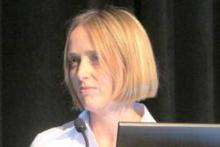DENVER – Patients with heavily pretreated advanced squamous cell non–small cell lung cancer (NSCLC) continued to receive clinical benefit from treatment with the checkpoint inhibitor nivolumab, longer-term results from a phase II clinical trial show.
Among 117 patients with squamous cell NSCLC that had progressed either during or after platinum-based doublet chemotherapy and at least one additional systemic regimen, the 12-month and 18-month overall survival (OS) rates were 39% and 27% respectively.
Historically, 1-year OS rates for patients with advanced squamous NSCLC treated with systemic chemotherapy ranged from 5% to 22%, and 2-year OS was less than 5%, said Dr. Leora Horn of the Vanderbilt-Ingram Cancer Center in Nashville, Tennessee.
“Consistent with randomized phase III trials, most treatment-related adverse events were of low grade and manageable with established safety guidelines, and most patients who experienced a treatment-related selected adverse event reported their first event within 3-6 months of treatment initiation. Clinical benefit with nivolumab was observed independent of [programmed death ligand 1] expression,” Dr. Horn said at a world conference on lung cancer.
Nivolumab (Opdivo) is an immune checkpoint inhibitor that has shown a survival benefit compared with docetaxel in patients with NSCLC of both adenocarcinoma and squamous cell histologies. It is approved in the U.S. for the treatment of metastatic squamous cell NSCLC which has progressed on therapy with a platinum-based doublet chemotherapy.
Dr. Horn presented updated efficacy and safety results from the previously reported phase II Checkmate 063 trial.
The investigators screened 140 and treated 117 patients with stage IIIB to stage IV squamous NSCLC who had disease progression on two or more prior lines of systemic chemotherapy and an Eastern Cooperative Oncology Group (ECOG) performance status of 0 or 1.
The patients received nivolumab 3 mg/kg by intravenous infusion every 2 weeks until disease progression or unacceptable toxicity.
As of July 2014, the date of the first analysis, after a median follow-up of 8 months the median overall survival was 8.2 months, and the 1-year overall survival rate was 41%.
Updated survival data as of June 2015, showed that the median OS was 8.1 months, and the overall survival at 1 year was 39%. As noted before, the 18-month overall survival was 27%.
An analysis stratified by PD-L1 expression showed a median OS of 8.3 months for patients with less than 1% of tumor cells expressing PD-L1, compared with 10.1 months for patients with 1% or more of tumor cells expressing the ligand. Among 10 patients not evaluable for PD-L1 expression, the median OS was 13 months.
Adverse event (AE) rates remained stable from 1 year to the next, with 74% of patients in July 2014 having had any grade of AE, compared with 75% of patients in June 2015. The percentage of patients who experienced a grade 3 or 4 adverse event was 17% for each analysis, indicating that the grade 3/4 events occurred early in the course of treatment. The two treatment-related deaths, one from hypoxic pneumonia and the other from ischemic stroke, were reported in the previous analysis.
The most common treatment-related select adverse events of any grade were gastrointestinal (10% in the current and previous analyses), pulmonary (6% vs. 5% in the previous analysis), and skin related (16% vs. 15%, respectively).
The survival data are consistent with those seen in the long-term follow-up data from the Checkmate 017 trial, in which nivolumab was compared with docetaxel in patients with advanced squamous NSCLC, commented Dr. Solange Peters of the Lausanne (Switzerland) University Hospital, the invited discussant.
The slightly better survival in the 017 trial is likely due to the fact the majority of patients in the 063 trial were heavily pretreated, with 65% having received three or more prior lines of therapy, Dr. Peters said at the conference sponsored by the International Association for the Study of Lung Cancer.


